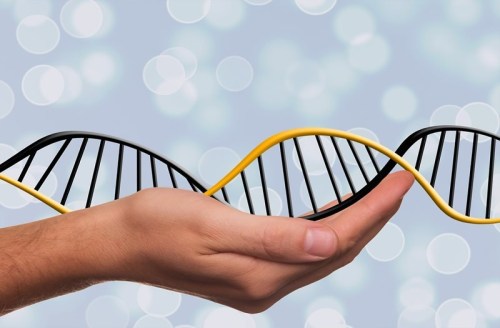A new study reports diseases such as cancers, Alzheimer’s disease, and diabetes may have a genetic contribution of 5-10% at most. Source: University of Alberta
I can’t tell you how happy I was to learn this. I have had friends who threw up their hands when it came to living a healthy life. They said they failed because of their ‘bad genes.’ I always felt this was a cop out and total denial of responsibility and now it seems I was correct. Take responsibility.
In most cases, your genes have less than five percent to do with your risk of developing a particular disease, according to new research by University of Alberta scientists.

The study also highlights some notable exceptions, including Crohn’s disease, celiac disease, and macular degeneration, which have a genetic contribution of approximately 40 to 50 per cent. The image is in the public domain.
In the largest meta-analysis ever conducted, scientists have examined two decades of data from studies that examine the relationships between common gene mutations, also known as single nucleotide polymorphisms (SNPs), and different diseases and conditions. And the results show that the links between most human diseases and genetics are shaky at best.
“Simply put, DNA is not your destiny, and SNPs are duds for disease prediction,” said David Wishart, professor in the University of Alberta’s Department of Biological Sciences and the Department of Computing Science and co-author on the study. “The vast majority of diseases, including many cancers, diabetes, and Alzheimer’s disease, have a genetic contribution of 5 to 10 percent at best.”
The study also highlights some notable exceptions, including Crohn’s disease, celiac disease, and macular degeneration, which have a genetic contribution of approximately 40 to 50 percent.
“Despite these rare exceptions, it is becoming increasingly clear that the risks for getting most diseases arise from your metabolism, your environment, your lifestyle, or your exposure to various kinds of nutrients, chemicals, bacteria, or viruses,” explained Wishart.
Wishart and his research collaborators suggest that measuring metabolites, chemicals, proteins, or the microbiome provides a much more accurate measure of human disease risk and are also more accurate for diagnosis. The findings fly in the face of many modern gene testing businesses models, which suggest that gene testing can accurately predict someone’s risk for disease.
“The bottom line is that if you want to have an accurate measure of your health, your propensity for disease or what you can do about it, it’s better to measure your metabolites, your microbes or your proteins–not your genes,” added Wishart. “This research also highlights the need to understand our environment and the safety or quality of our food, air, and water.”








Very informative 👍
LikeLiked by 1 person
If as the article says, one’s metabolism is affected by genetics as much as 40%, then that is an obstacle much greater than 5%.
LikeLiked by 1 person
Please read the entire post … “Despite these rare exceptions, it is becoming increasingly clear that the risks for getting most diseases arise from your metabolism, your environment, your lifestyle, or your exposure to various kinds of nutrients, chemicals, bacteria, or viruses,” explained Wishart.”
LikeLike
Yep I did
LikeLike
I suggest you read it again. Don’t think you got it.
LikeLike